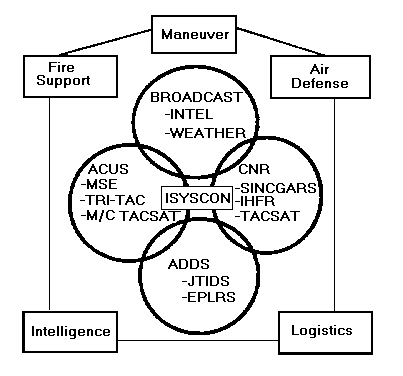Section II. Signal Responsibilities
The signal officer works for the force commander and is responsible for providing signal support for the following areas: the Army Tactical Command and Control System (ATCCS), Battlefield Information Services (BIS), and Tactical VI Systems.
1-7. Army Tactical Command and Control System
ATCCS is the integration of the IMA disciplines of communications and automation. All information relating to the battle is divided into seven categories called Battlefield Operating Systems (BOSs) or Battlefield Functional Areas (BFAs). They are--
- Maneuver.
- Fire support.
- Air defense.
- Battle command.
- Intelligence.
- Mobility and survivability.
- Logistics.
TRADOC Pamphlet 11-9 covers this subject in more detail.
These information systems consist of computer hardware and software that organize and manage battlefield information. All systems must be interconnected to successfully pass voice, message, and data traffic to and from the commander, his staff, and higher and lower echelons. Signal support provides the means to interconnect the BOSs. This is done through four tactical communications systems that support the BFAs. They are ACUS, CNR, ADDS, and broadcast. See Figure 1-2.
Figure 1-2. The Army communications architecture.

1-8. Battlefield Information Services
Two IMA disciplines, records management and printing and publications compose the BIS. BIS are administrative services that are performed on the battlefield. When a maneuver unit deploys, the organic signal element is responsible for BIS. At brigade and battalion, the Information Services Support Officer (ISSO) is the S1. At division and corps, the ISSO is in the assistant division signal office (ADSO)/G6. The Directorate of Information Management (DOIM) is responsible for BIS in garrison. The nine BIS are--
- Printing.
- Publications.
- Forms management.
- Reproduction.
- Classified document control.
- Distribution/official mail (E-mail).
- Correspondence.
- Files management.
- FOIA/PA.
Direct Action. A central point of contact, under control of the signal officer, receives and routes all requests relating to the service. Only three of the nine BIS require direct action. These are distribution, printing, and FOIA/ PA.
Distribution consists of--
- Recommending distribution policies and procedures.
- Internal headquarters distribution.
- Coordinating resources for messenger service.
- Official mail and accountable distribution.
- Distribution center operations and pick-up.
- Reviewing and validating printing requests.
- Forwarding print requests to the theater reproduction
team.
- Recommending policies and procedures regarding both
acts.
- Establishing a point of contact in matters pertaining
to either act.
Users must perform all user level BIS. Any questions regarding policies or use of the BIS should be addressed to the signal officer.
FM 11-75 covers this subject in more detail.
Begin Chapter 2
Table of Contents
Index
|
NEWSLETTER
|
| Join the GlobalSecurity.org mailing list |
|
|
|

